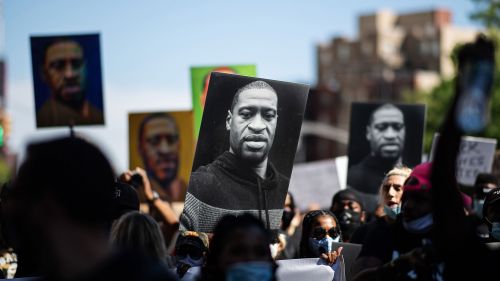George Floyd Protests and Public Opinion

Recent surveys conducted over the past week show that a majority of Americans sympathize with the protests occurring across the country since the death of George Floyd.
Introduction
Recent surveys conducted over the past week show that a majority of Americans sympathize with the protests occurring across the country since the death of George Floyd. The public condemnation from police chiefs in Minneapolis and other cities around the country toward the officer who killed Floyd, a noticeable shift from previous racist incidents, may perhaps have led to greater public acknowledgment of biased police treatment in America. Nonetheless, protests continue with numerous instances of violent repression by the police.
Aware and sympathetic, but not of violence
A Monmouth University telephone poll conducted May 28-June 1 found nearly all Americans have heard about the incident resulting in the death of George Floyd (97%). Among those aware, nearly eight in ten combined say that the anger that led to the protests in reaction to Minneapolis police treatment of Floyd is fully (57%) or partially (21%) justified. Fewer believe that the "actions of the protestors" have been fully (17%) or partially (37%) justified, likely because some interpret these actions to be violent ones.
In another example, a Reuters/Ipsos online poll conducted June 1-2 found that 82 percent of Americans say that peaceful protests are an appropriate response to the killing of an unarmed man by police, while 22 percent say that violence and unrest is an appropriate response. Eight in ten (79%) also agree that "the property damage caused by some protesters undermine the original protests' case for justice."
Majorities say police treat black Americans unfairly
At the heart of the protests is the issue of fair treatment by the police. A CBS News/YouGov online poll fielded May 29-June 1 reported that a majority of Americans (57%) believe the police in most communities treat whites better than blacks, while 39% say they're treated equally (4% believe blacks are treated better than whites).
The Monmouth poll asked a similar question and found that more Americans now sense discrimination from police than they did in previous situations. A majority of Americans (57%) now say that police officers facing a difficult or dangerous situation are more likely to use excessive force if the culprit is black, up from a third (34%) in July 2016 after the police shooting of Alton Sterling in Louisiana and in December 2014 (33%) after a grand jury declined to indict a NYC police officer in the death of Eric Garner. More generally, a majority of Americans (53%) say race relations in the US have gotten worse since President Donald Trump took office four years ago, about the same share (53%) who felt that way after eight years of former President Barack Obama's tenure.
A June 3-4 ABC News/Ipsos poll conducted online using Ipsos' KnowledgePanel found that three in four Americans (74%) believe the recent death of George Floyd in Minneapolis is a sign of broader problems in the treatment of American Americans by the police. That marks a notable shift from late 2014, when an ABC News/Washington Post poll asked whether the recent killings of unarmed African American men by police in Ferguson and New York City were isolated incidents, or a sign of a broader problem. Then, half of Americans (51%) saw these deaths as isolated incidents, while four in ten (43%) said they were part of a broader problem.
Partisanship a greater factor than race
Many of the results show that views of police treatment differ by race, with black Americans more likely to sense discrimination than whites. But on several of these issues, partisanship is a greater factor than race in responses. According to a Monmouth poll asking about whether the actions of the protesters were justified, the gap in responses between Republicans and Democrats is much more vast (Republican 27% net justified vs. Democrat 72% net justified) than the gap between Whites and non-Whites (Whites 48% net justified vs. non-White 65% net justified).

That same partisan division also appears in the ABC News/Ipsos data. While majorities of all subgroups say that George Floyd’s death is a sign of broader problems in the treatment of African Americans by police, the gap between African Americans (94%) and Whites (70%) is notably smaller than the partisan gap between Democrats (92%) and Republicans (55%).
On the subject of the president's response to the protest, the Reuters/Ipsos poll shows an equally stark partisan divide. While 67 percent of Republicans either strongly approve (34%), somewhat approve (21%), or lean toward approval (12%), 85 percent of Democrats strongly (70%), somewhat (9%), or lean disapprove (6%).
Race, police, and the 2020 election
These results indicate a crucial political divide as America approaches the 2020 presidential race. However, the spectrum of opinion on racial issues and police brutality cannot be distilled into simply Republican and Democrat ideas; within each party, there are divergent attitudes. In the Democratic sphere, some prefer to defund or abolish the police while centrist Democrats want reform, including the reduction of deadly-force encounters, de-escalation training, and oversight by external law enforcement agencies instead of in-house watchdogs.
For Republicans too, the centrists prefer reform while the farther right elements call for violent quelling of the protests—see Donald Trump's tweets regarding the Minneapolis protests or Senator Tom Cotton's op-ed calling for military force against rioters. Fortunately, cooler heads like former defense secretary James Mattis and current defense secretary Mark Esper have denounced calls to use the military against protesters.
Given the opposing responses to the protests by Joe Biden and Donald Trump, it is clear that there will be discussion of police reform in run-up to the election. Already, there are indications of how this will take shape. For Trump, look no further than his walk from the White House to St. John's Church as police employed tear gas, flash and smoke grenades, and physical violence to disperse peaceful protesters. For Biden, he has seized on this moment to stand in opposition to Trump's response to the protests, delivering a speech in Philadelphia condemning Trump's divisive and violent rhetoric. Nonetheless, it is unlikely that either candidate will promote calls to defund or abolish the police at the local or state levels, and reforms that affect substantial change remain to be seen.



